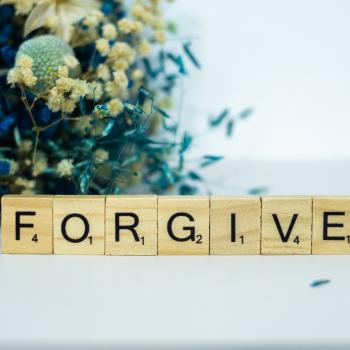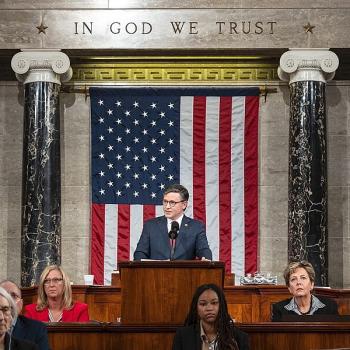And lest there be any mistake here, the Greek is far more clear than the English, for there is a play on words that is non-translatable between the two languages. In the Greek the words 'father' and 'family,' have the same root and sound similar: πατέρα and πατριὰ. For this reason I bow my knees before the πατέρα, from whom every πατριὰ in heaven and on earth is named. Or, to translate it differently, For this reason I bow my knees before the family-maker, from whom every family in heaven and on earth is named ... so that he might create in himself one new humanity in place of the two, thus making peace.
So what does this have to do with us? Biblical scholar Walter Wink believes that the greatest religious issue of our day is contained in today's lesson: How is it possible to live together as family members of God rather than as enemies of each other? He writes, "I submit that the ultimate religious question today should no longer be the Reformation's question, ‘How can I find a gracious God?' but rather, ‘How can we find God in our enemies?' What guilt was for Luther the enemy has become for us: the goad that can drive us to God." 1
As in no other time in history, our failure to do as Christ bade us and love our enemies has cataclysmic potentialities. Wink argues, in fact, that in our age there is no other way to God except through our enemies, because loving our enemies has become a key to human survival. The Cold War may in fact be over, but we are watching as unstable governments build nuclear weapons and the means to deliver them to targets at great distances; we are watching as terrorists are trying very hard to get their hands on those weapons and, in the name of God, kill their enemies; we are watching as diminished religions proclaim their tightening orthodoxy and potentially ignite massive destruction and death.
Thus the question that today's text raises for us is, as a community that defines itself as theologically progressive, how are we living and proclaiming the gospel so that we can be an expansive witness to an increasingly constrictive orthodoxy? How can we be a visible, tangible manifestation of the one new humanity proclaimed in Ephesians? In the midst of larger, louder, and more orthodox churches, how do we proclaim the gospel not as a test of orthodoxy, but rather an invitation to orthopraxis, that is, of right practice? This is what our tradition has always proclaimed as the true test of Christian community. Walter Wink writes:
Jesus' teaching about nonviolent direct action and love of enemies are the acid tests of true Christianity. Just as in the lore of exorcism the devil cannot bear to utter the name of God, so our false prophets today cannot tolerate the mention of the love of enemies. The Rev. Greg Dixon, a former state chair and National Secretary for the Moral Majority, recently urged his followers to pray for the death of their opponents, claiming, "We're tired of turning the other cheek ... good heavens, that's all we have done." .... No false prophet can ever conceive of God as being God also of the enemy. 2
I propose to you that we must be in the business of countering that unbiblical theology. I propose to you that living into the "breadth and the width and the height and depth" of today's text is an urgent need of this and many other pockets of diverse religions and philosophies. God is God, no matter what name we and other pockets of faithful people provide. We and they have a proclamation of expansive love that we need to share with the world. We and they have a faith that responds to the urging of the Spirit rather than fear of enemies. Thus we unite with others different from us in belief, but not in praxis, and that practice is to love our enemies, to pray for those who persecute us, and to proclaim and live a love that has as its goal one new family of humanity, one created not in the image of one religion, but in the image of God from whom every family in heaven and on earth is named.
Lest we think this is easy, let me give you one very small example of how hard it will be, because sometimes it is easier to conceptually love our enemies at a distance, than to concretely love our family and friends beside us. And if we find it hard to love our family beside us ...
I received a letter from a one-time visitor to our church whose son was in a wheelchair. She noted that our church was a bastion of unwelcome to a boy who wanted to be included with the other children, but could not in a sanctuary that provided her child a wheelchair space off to the side in the back, on the outside looking in. Only once in the four years I have been here have we broached the potential need for sanctuary renovation. And it was clear to me how hard it is to love the church family beside us. Because once we begin to apply inclusive theology to the very way we structure our space, our worship, our life together, we learn that what God asks of us pushes us sometimes outside our comfort zones. Yet is this not what this expansive theology proclaimed in today's text does by definition - push us beyond our comfort zones, even with those with whom we have promised to walk the pilgrim way of discipleship? If we are to proclaim love of enemy and then practice it, we must first love each other.




